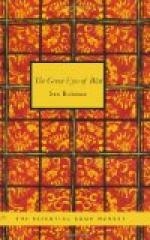“But he may not have been in the crate when Bolton and I saw it.”
“I don’t believe he was in the crate then,” replied Gatton, “but I think he was at the Red House nevertheless.”
I stared at him with curiosity.
“You mean that he was in the house at the time that the constable and I opened the garage?”
“I do. I think he was in that room where supper was laid for two.”
“Good God!” I exclaimed; for there was something horrible in the idea of the man who now lay murdered having been in the house presumably alive, whilst Bolton and I had stood within forty yards of him; in the idea that it had lain in our power, except for those human limitations which rendered us ignorant of his presence, to have averted his fate, perhaps to have checked the remorseless movement of this elaborate murder machine which seemingly had been set up in the Red House.
“Some one was here last night,” declared Gatton suddenly, as we turned to leave the deserted room, “after you and Bolton had gone. Everything incriminating the assassin has been removed. Looking at the matter judicially, it becomes quite evident that any one clever enough to have planned this crime could not possibly have been guilty of an act of such glaring stupidity as that of accidentally leaving a photograph planted upon the mantelpiece.”
That this fact had presented itself to the Inspector with such a force of conviction raised a great load from my mind. It had all along been evident to me, but I had feared that to the official outlook of my companion, and the official outlook is always peculiar, it might have seemed otherwise.
“The clever and cunning villain who planned this thing,” I said, “has overstepped himself, as you say, Gatton. If the murder was planned artistically, in his attempt to throw the onus of the crime upon innocent shoulders he has been guilty of a piece of very mediocre work. It would not deceive a child.”
“No, I agree with you there. The discovery of that photograph has done more to convince me of the innocence of Miss Merlin than any amount of testimonials to her good character could ever have done. You see,” he added, smiling whimsically, “all sorts of people hitherto unsuspected by their closest friends of criminal tendency, develop that taint, so that I am never surprised to find a convicted thief or assassin possessed of credentials which would do justice to an Archbishop. But when I see an obviously artificial clew I recognize it a mile off. Real clews never stare you in the face like that.”
Coming out of the front door, we walked down the leaf-strewn drive to find that the constable on duty at the gate had been joined by a plain-clothes man who was evidently waiting to speak to the Inspector.
“Yes?” said Gatton eagerly, at sight of the newcomer.
“We have her, sir,” he reported tersely.
“Does he refer to Marie?” I asked.




